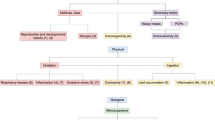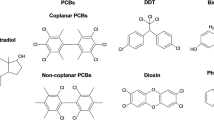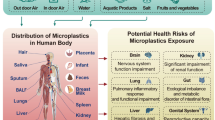Abstract
Organophosphate (OP) pesticides may accumulate in pregnant agricultural workers, resulting in adverse effects on the growth and development of the fetus and neonates. This study aims to evaluate a possible association between prenatal urinary OP metabolite levels among pregnant agricultural workers and birth outcomes of infants. This study also investigated the factors associated with urinary OP metabolites among pregnant agricultural workers. The spot urine samples were collected and analyzed for six OP metabolite levels. Birth outcomes data were abstracted from medical records. Multiple regression analysis found that gestational age at childbirth was negatively associated with diethylphosphate (DEP) levels (β = −0.073; 95% CI, −0.121, −0.024). Apgar score at 1 and 5 min after birth were negatively associated with diethyldithiophosphate (DEDTP) levels (β = −0.036; 95% CI, −0.069, −0.003; and β = −0.034, 95% CI, −0.057, −0.011, respectively). In addition, DEDTP levels were negatively associated with maternal age (β = −0.181; 95% CI, −0.339, −0.023), and dimethylphosphate (DMP) levels were positively associated with frequency of agricultural work during pregnancy (β = 31.554; 95% CI, 0.194, 62.914). Our results indicate that prenatal OP exposure can cause adverse birth outcomes in babies. Therefore, it is necessary to develop an effective strategy for reducing prenatal exposure to OP pesticides.


Similar content being viewed by others
Abbreviations
- AChE:
-
Acetylcholiesterase enzyme
- Β :
-
Beta
- 95%CI:
-
95% confidence interval
- DAP:
-
Dialkylphosphate
- DEDTP:
-
Diethyldithiophosphate
- DEP:
-
Diethylphosphate
- DETP:
-
Diethylthiophosphate
- DMDTP:
-
Dimethyldithiophosphate
- DMP:
-
Dimethylphosphate
- DMTP:
-
Dimethylthiophosphate
- GM:
-
Geometric mean
- LOD:
-
Limit of detection
- LOQ:
-
Limit of quantification
- Max:
-
Maximum
- Min:
-
Minimum
- OP:
-
Organophosphate
- PPE:
-
Personal protective equipment
- SD:
-
Standard deviation
References
Apgar V (2015) A proposal for a new method of evaluation of the newborn infant. Anesth Analg 120(5):1056–1059. https://doi.org/10.1213/ANE.0b013e31829bdc5c
Berkowitz GS, Wetmur JG, Birman-Deych E, Obel J, Lapinski RH, Godbold JH, Holzman IR, Wolff MS (2004) In utero pesticide exposure, maternal paraoxonase activity, and head circumference. Environ Health Perspect 112(3):388–391. https://doi.org/10.1289/ehp.6414
Berman T, Hochner-Celnikier D, Barr DB, Needham LL, Amitai Y, Wormser U, Richter E (2011) Pesticide exposure among pregnant women in Jerusalem Israel: results of a pilot study. Environ Int 37:198–203. https://doi.org/10.1016/j.envint.2010.09.002
Bradman A, Barr DB, Claus Henn BG, Drumheller T, Curry C, Eskenazi B (2003) Measurement of pesticides and other toxicants in amniotic fluid as a potential biomarker of prenatal exposure: a validation study. Environ Health Perspect 111(14):1779–1782. https://doi.org/10.1289/ehp.6259
Bureau of Agricultural Regulation, Department of Agriculture, Thailand (2017) Agricultural hazardous substances import in Thailand 2016 report. https://www.thaipan.org/stat/408. Accessed 29 September 2020
Diomedi BZ, Nauges C (2016) Pesticide-handling practices: the case of coffee growers in Papua New Guinea. Aust J Agric Resour Econ 60(1):112–129. https://doi.org/10.1111/1467-8489.12106
Donauer S, Altaye M, Xu Y, Sucharew H, Succop P, Calafat AM, Khoury JC, Lanphear B, Yolton K (2016) An observational study to evaluate associations between low-level gestational exposure to organophosphate pesticides and cognition during early childhood. Am J Epidemiol 184(5):410–418. https://doi.org/10.1093/aje/kwv447
Dries MA, Pronk A, Guxens M, Spaan S, Voortman T, Jaddoe VW, Jusko TA, Matthew P, Longnecker MP, Tiemeier H (2018) Determinants of organophosphate pesticide exposure in pregnant women: a population-based cohort study in the Netherlands. Int J Hyg Environ Health 221(3):489–501. https://doi.org/10.1016/j.ijheh.2018.01.013
Ehrenstein V (2009) Association of Apgar scores with death and neurologic disability. Clin Epidemiol 1:45–53. https://doi.org/10.2147/clep.s4782
Engel SM, Berkowitz GS, Barr DB, Teitelbaum SL, Siskind J, Meisel SJ, Wetmur JG, Wolff MS (2007) Prenatal organophosphate metabolite and organochlorine levels and performance on the Brazelton Neonatal Behavioral Assessment Scale in a multiethnic pregnancy cohort. Am J Epidemiol 165(12):1397–1404. https://doi.org/10.1093/aje/kwm029
Eskenazi B, Bradman A, Castorina R (1999) Exposures of children to organophosphate pesticides and their potential adverse health effects. Environ Health Perspect 107(3):409–419. https://doi.org/10.1289/ehp.99107s3409
Eskenazi B, Harley K, Bradman A, Erin Weltzien E, Jewell NP, Barr DB, Furlong CE, Holland NT (2004) Association of in utero organophosphate pesticide exposure and fetal growth and length of gestation in an agricultural population. Environ Health Perspect 112(10):1116–1124. https://doi.org/10.1289/ehp.6789
Farahat T, Shaheen HM, Sanad Z, Farag NA (2016) Organophosphate pesticide exposure during pregnancy and adverse perinatal outcome. J Women's Health Care 5(5):1000336. https://doi.org/10.4172/2167-0420.1000336
Ferguson KK, Dries MA, Gaillard R, Pronk A, Spaan S, Tiemeier H, Jaddoe VWV (2019) Organophosphate pesticide exposure in pregnancy in association with ultrasound and delivery measures of fetal growth. Environ Health Perspect 127(8):087005. https://doi.org/10.1289/EHP4858
Furlong CE, Holland N, Richter RJ, Bradman A, Ho A, Eskenazi B (2006) PON1 status of farmworker mothers and children as a predictor of organophosphate sensitivity. Pharmacogenet Genomics 16:183–190. https://doi.org/10.1097/01.fpc.0000189796.21770.d3
Gupta RC (2004) Brain regional heterogeneity and toxicological mechanisms of organophosphates and carbamates. Toxicol Mech Methods 14:103–143. https://doi.org/10.1080/15376520490429175
Harley KG, Huen K, Schall RA, Holland NT, Bradman A, Barr DB, Eskenazi B (2011) Association of organophosphate pesticide exposure and paraoxonase with birth outcome in Mexican-American Women. PLoS One 6(8):e23923. https://doi.org/10.1371/journal.pone.0023923
Hornung RW, Reed LD (1990) Estimation of average concentration in the presence of nondetectable values. Appl Occup Environ Hyg 5(1):46–51. https://doi.org/10.1080/1047322X.1990.10389587
Khan M (2009) Adverse health effects, risk perception and pesticide use behaviour. MPRA. https://mpra.ub.uni-muenchen.de/id/eprint/16276. Accessed 25 September 2020
Kongtip P, Nankongnab N, Woskie S, Phamonphon A, Tharnpoophasiam P, Wilaiwan K, Srasom P (2013) Organophosphate urinary metabolite levels during pregnancy, delivery and postpartum in women living in agricultural areas in Thailand. J Occup Health 55(5):367–375. https://doi.org/10.1539/joh.13-0040-OA
Kongtip P, Techasaensiri B, Nankongnab N, Adams J, Phamonphon A, Surach A, Sangprasert S, Thongsuksai A, Srikumpol P, Woskie S (2017) The impact of prenatal organophosphate pesticide exposures on Thai infant neurodevelopment. Environ Res Public Health 14(6):570. https://doi.org/10.3390/ijerph14060570
Lewis RC, Cantonwine DE, Anzalota Del Toro LV, Calafat AM, Valentin-Blasini L, Mark D, Davis MD, Montesano MA, Alshawabkeh AN, Cordero JF, Meeker JD (2015) Distribution and determinants of urinary biomarkers of exposure to organophosphate insecticides in Puerto Rican pregnant women. Sci Total Environ 15:337–344. https://doi.org/10.1016/j.scitotenv.2015.01.059
Lie KK, Groholt EK, Eskild A (2010) Association of cerebral palsy with Apgar score in low and normal birth weight infants: population based cohort study. BMJ 341:c4990. https://doi.org/10.1136/bmj.c4990
Llop S, Murcia M, Iniguez C, Roca M, Gonzalez L, Yusa V, Rebagliato M, Ballester F (2017) Distributions and determinants of urinary biomarkers of organophosphate pesticide exposure in a prospective Spanish birth cohort study. Environ Health 16(1):46. https://doi.org/10.1186/s12940-017-0255-z
Memon QUA, Wagan SA, Chunyu D, Shuangxi X, Jingdong L, Dalamas CA (2019) Health problems from pesticide exposure and personal protective measures among women cotton workers in southern Pakistan. Sci Total Environ 685:659–666. https://doi.org/10.1016/j.scitotenv.2019.05.173
Moster D, Lie RT, Irgens LM, Bjerkedal T, Markestad T (2001) The association of Apgar score with subsequent death and cerebral palsy: a population-based study in term infants. J Pediatr 138(6):798–803. https://doi.org/10.1067/mpd.2001.114694
Naksen W, Prapamontol T, Mangklabruks M, Chantara S, Thavornyutikarn P, Srinual N, Panuwet P, Ryan PB, Riederer AM, Barr DB (2015) Associations of maternal organophosphate pesticide exposure and PON1 activity with birth outcomes in SAWASDEE birth cohort, Thailand. Environ Res 142:288–296. https://doi.org/10.1016/j.envres.2015.06.035
Oyekale AS (2018) Cocoa farmers’ compliance with safety precautions in spraying agrochemicals and use of personal protective equipment (PPE) in Cameroon. Int J Environ Res Public Health 15(2):327. https://doi.org/10.3390/ijerph15020327
Papka RE, Traurig HH, Schemann M, Collins J, Copelin T, Wilson K (1999) Cholinergic neurons of the pelvic autonomic ganglia and uterus of the female rat: distribution of axons and presence of muscarinic receptors. Cell Tissue Res 296(2):293–305. https://doi.org/10.1007/s004410051290
Prapamontol T, Sutan K, Laoyang S, Hongsibsong S, Lee G, Yano Y, Hunter RE, Ryan PB, Barr DB, Panuwet P (2014) Cross validation of gas chromatography-flame photometric detection and gas chromatography–mass spectrometry methods for measuring dialkylphosphate metabolites of organophosphate pesticides in human urine. Int J Hyg Environ Health 217(4–5):554–566. https://doi.org/10.1016/j.ijheh.2013.10.005
Rauch SA, Braun JM, Barr DB, Calafat AM, Khoury J, Montesano AM, Yolton K, Lanphear BP (2012) Associations of prenatal exposure to organophosphate pesticide metabolites with gestational age and birth weight. Environ Health Perspect 120(7):1054–1060. https://doi.org/10.1289/ehp.1104615
Sapbamrer R, Hongsibsong S (2019) Effects of prenatal and postnatal exposure to organophosphate pesticides on child neurodevelopment in different age groups: a systematic review. Environ Sci Pollut Rec 26(5):18267–18290. https://doi.org/10.1007/s11356-019-05126-w
Sapbamrer R, Thammachai A (2020) Factors affecting use of personal protective equipment and pesticide safety practices: a systematic review. Environ Res 185:109444. https://doi.org/10.1016/j.envres.2020.109444
Shang L, Huang L, Yang L, Leng L, Qi C, Xie G, Wang R, Guo L, Yang W, Chung MC (2021) Impact of air pollution exposure during various periods of pregnancy on term birth weight: a large-sample, retrospective population-based cohort study. Environ Sci Pollut Rec 28:3296–3306. https://doi.org/10.1007/s11356-020-10705-3
Silver MK, Shao J, Zhu B, Chen M, Xia Y, Kaciroti N, Lozoff B, Meeker JD (2017) Prenatal naled and chlorpyrifos exposure is associated with deficits in infant motor function in a cohort of Chinese infants. Environ Int 106:248–256. https://doi.org/10.1016/j.envint.2017.05.015
Sokoloff K, Fraser WD, Arbuckle TE, Fisher M, Gaudreau E, Le Blanc A, Morisset AS, Bouchard MF (2016) Determinants of urinary concentrations of dialkyl phosphates among pregnant women in Canada - results from the MIREC study. Environ Int 94:133–140. https://doi.org/10.1016/j.envint.2016.05.015
Wang P, Tian Y, Wang XJ, Gao Y, Shi R, Wang GQ, Hu GH, Shen XM (2012) Organophosphate pesticide exposure and perinatal outcomes in Shanghai, China. Environ Int 42:100–104. https://doi.org/10.1016/j.envint.2011.04.015
Wang J, Deng Y, Ma Y (2017) Relationships between safe pesticide practice and perceived benefits and subjective norm, and the moderation role of information acquisition: evidence from 971 farmers in China. Int J Environ Res Public Health 14(962):1–11. https://doi.org/10.3390/ijerph14090962
Wattananon Y (2012) The important role of nurses in labour room: health assessment of the newborn. Thai J Nurs Counc 15(4):51–65 (in Thai). https://he02.tcithaijo.org/index.php/TJONC/article/view/2316. Accessed 29 September 2020
Wolff MS, Engel S, Berkowitz G, Teitelbaum S, Siskind J, Barr DB, Wetmur J (2007) Prenatal pesticide and PCB exposures and birth outcomes. Pediatr Res 61(2):243–250. https://doi.org/10.1203/pdr.0b013e31802d77f0
Woskie S, Kongtip P, Thanasanpaiboon W, Kiatdamrong N, Charoonrungsirikul N, Nankongnab N, Surach A, Phamonphon A (2017) A pilot study of maternal exposure to organophosphate pesticides and newborn neurodevelopment in Thailand. Int J Occup Environ Health 23(3):193–201. https://doi.org/10.1080/10773525.2018.1450324
Ye X, Pierik FH, Hauser R, Hauser R, Duty S, Angerer J, Park MM, Burdorf A, Hofman A, Jaddoe VWV, Mackenbach JP, Steegers EAP, Tiemeier H, Longnecker MP (2008) Urinary metabolite concentrations of organophosphorous pesticides, bisphenol A and phthalates among pregnant women in Rotterdam the Netherlands: the generation R study. Environ Res 108:260–267. https://doi.org/10.1016/j.envres.2008.07.014
Yolton K, Xu Y, Sucharew H, Succop P, Altaye M, Popelar A, Montesano MA, Calafat AM, Khoury JC (2013) Impact of low-level gestational exposure to organophosphate pesticides on neurobehavior in early infancy: a prospective study. Environ Health 12(79):1–10. https://doi.org/10.1186/1476-069X-12-79
Zhang Y, Han S, Liang D, Shi X, Wang F, Liu W, Zhang L, Chen L, Gu Y, Tian Y (2014) Prenatal exposure to organophosphate pesticides and neurobehavioral development of neonates: a birth cohort study in Shenyang, China. PLoS One 9(2):e88491. https://doi.org/10.1371/journal.pone.0088491
Acknowledgements
This study was supported by the Faculty of Medicine Research Fund, Chiang Mai University, Thailand (Grant No. 029/2563). We would like to thank all pregnant farmworkers and their infants who volunteered to participate in this study. We also express our thanks to the Research Administration Section, Faculty of Medicine, Chiang Mai University, for their assistance with the English language editing.
Availability of data and materials
Not applicable.
Funding
This study was supported by the Faculty of Medicine Research Fund, Chiang Mai University, Thailand (Grant No. 029/2563).
Author information
Authors and Affiliations
Contributions
Conceptualization: Boonsita Suwannakul, Ratana Sapbamrer, Natrujee Wiwattanadittakul, and Surat Hongsibsong. Methodology: Boonsita Suwannakul, Ratana Sapbamrer, Natrujee Wiwattanadittakul, and Surat Hongsibsong. Formal analysis and investigation: Boonsita Suwannakul and Ratana Sapbamrer. Writing—original draft preparation: Boonsita Suwannakul. Writing—review and editing: Ratana Sapbamrer. Funding acquisition: Ratana Sapbamrer, Boonsita Suwannakul. Resources: Ratana Sapbamrer, Natrujee Wiwattanadittakul, and Surat Hongsibsong. Supervision: Ratana Sapbamrer.
Corresponding author
Ethics declarations
Ethics approval and consent to participate
The study was reviewed and approved by the Human Ethical Committee at the Faculty of Medicine, Chiang Mai University (No. 221/2562), before we began data collection.
Consent for publication
Not applicable.
Competing interests
The authors declare no competing interests.
Additional information
Responsible Editor: Lotfi Aleya
Publisher’s note
Springer Nature remains neutral with regard to jurisdictional claims in published maps and institutional affiliations.
Rights and permissions
About this article
Cite this article
Suwannakul, B., Sapbamrer, R., Wiwattanadittakul, N. et al. Prenatal organophosphate exposure can cause adverse birth outcomes to humans. Environ Sci Pollut Res 28, 45064–45074 (2021). https://doi.org/10.1007/s11356-021-13974-8
Received:
Accepted:
Published:
Issue Date:
DOI: https://doi.org/10.1007/s11356-021-13974-8




